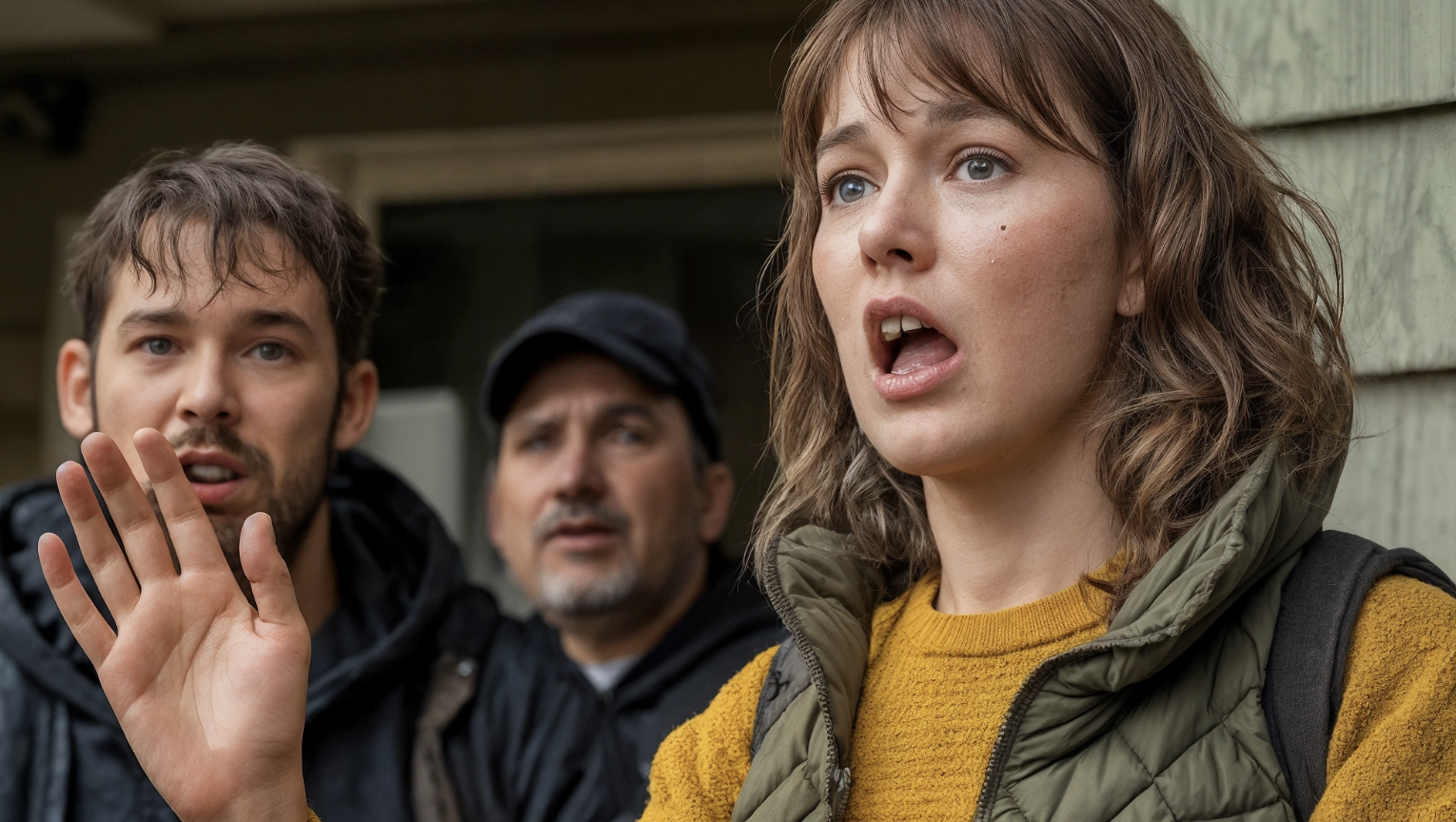When mom left, I still couldn’t get used to the idea that it was all over — without her. The house stood empty, soaked in her scent, quiet, lost, as if it didn’t know where to go now. I sat on the old couch, looked at the worn wallpaper, listened to the floorboards creak, and caught myself thinking that all of this was left to me. The house, the land, the garden with broken swings — it was all mine now.
And I should be happy. People dream of owning their own homes, and here I was — with an entire estate. But instead of happiness, there was this dull feeling in my chest, as if I had intruded on someone else’s life, a life where I wasn’t expected.
At first, I decided not to change anything. I’d leave everything as it was. I even kept the chair by the window, though I knew no one would ever sit there to knit again. I just closed the door to that room — I couldn’t bring myself to open it.
For two weeks, I went there every day. Sometimes to mop the floors, sometimes to water the plants. Sometimes I sat on the porch with a cup of coffee, listening to the sparrows chirping on the bird cherry tree. It felt as if any moment the gate would slam, and mom would come back from work, scold me for buying the wrong cheese, and make her famous compote. But the gate stayed closed.
Then it started.
First, my cousin came. Gena. We saw each other about once every five years at most. But now, he showed up — with a gift, a bottle of wine, and a smirk.
“Well, what’s up, the lady of the house? Now you’re a rich woman?”
I just snorted. Rich? The house was old, the land overgrown, the walls cracked. It would cost more to fix than it was worth.
But Gena was in a cheerful mood.
“Don’t even think about selling,” he said, pouring himself more wine. “Better, let’s fix it up together. I’ve been thinking, we could rent out a room. Or even turn it into a rest home. People pay a lot for privacy these days!”
I didn’t say anything. At that time, I didn’t understand what was behind it.
The next day, his mother, Aunt Lida, arrived. She hugged me, teared up, looked at the house, and immediately started giving advice.
“Oh, why do you need so much land? It’s just a wasteland! You should dig it all up and sell it as plots. We can help, we know people in the administration.”
I remained silent. All of this scared me. I just wanted peace, for no one to touch the house. But Aunt Lida and Gena were already discussing something, making plans, whispering on the porch.
I started visiting less. I increasingly felt like I didn’t belong there. Like this wasn’t my house, but theirs.
Then Gena called.
“We’ve been thinking,” he said, without much politeness. “You won’t be able to manage. The house is old, it’ll fall apart soon. Sell it to us. For a fair price. Honestly.”
I almost dropped the phone.
“What do you mean, sell?”
“Well, what else? You won’t be able to handle it. The house is old, you don’t have the strength. We need the space. We helped you when you needed it. We looked after your aunt too. We didn’t run around here for nothing. Now something should come our way.”
I didn’t know what to say. My chest tightened with hurt and anger. They hadn’t lifted a finger while mom was alive. And now, suddenly, “they need the space.”
I hung up and drove there.
They were already there. Bossing around in the yard, hauling things out of the shed, making plans.
When I walked up, Gena just smirked.
“Oh, the lady of the house has arrived! Decided to accept our offer?”
I looked at them and felt everything boil inside me.
“This is my house,” I said. “And I’m not selling anything to you.”
Aunt Lida rolled her eyes.
“Think about it. Look at you, all proud! First, live in this shed for the winter, then we’ll talk. And don’t turn your nose up at family, we’re offering you a deal! You’re young, you don’t know what it’s like, why would you need such a burden?”
They left. Not immediately. Grumbling, glancing at me, but they left. And I sat on the old bench, wrapped in a scarf, watching the wind flutter the curtains on the second floor.
The house was mine. On paper. By inheritance. But suddenly, I felt scared. I realized they wouldn’t stop. And this was only the beginning.
A couple of days later, Gena called again. No sweet words this time.
“So, what did you decide?” he asked, without any greeting.
“I’m not selling,” I replied. “The house stays with me.”
“Well, well,” he smirked. “Let’s see how you’ll sing in the winter.”
I slammed the phone down. My heart was pounding like crazy. Fear mixed with anger. Why should I explain anything to anyone? Mom’s house, her land, all of this — memories, not merchandise.
But it didn’t end with Gena. On the weekend, he came, not alone — but with some men. They went out, walked around the land, measured things with a tape measure, talked, laughed. I peeked out the window — blood rushed to my cheeks.
I ran outside in my slippers.
“What are you doing here?!” I yelled.
Gena looked at me like I was an annoying fly.
“What’s your problem? Just looking around. The land’s good, flat. Think it over. We’ll settle it neighborly.”
I stood in the middle of the yard, feeling like I was the outsider in my own house. As if they had already made the decisions for me.
After that day, I was scared to go back. It felt like someone was standing behind the fence, watching me. At night, I heard rustling sounds, as if someone was walking near the gate.
A couple of times, I even called the police. But when the officers arrived, no one was there.
“Looks like you just imagined it,” they smiled. “There’s no one here.”
But I knew I hadn’t imagined it.
Weeks passed. I tried to hold on. I transferred all the bills to my name, paid the taxes. Slowly, I started cleaning up. By myself. Without Gena’s “helpers.” I painted the fence, patched the roof, weeded the garden.
Then, one day, when I arrived at the house, I saw that the gate was broken. The lock was crooked. The gate was ajar.
I entered cautiously, as if stepping on a “minefield.” At first, everything seemed in place. But in the shed, where mom kept old things, someone had rummaged through. Things were scattered, boxes opened.
I sat on the bench and cried. It wasn’t about the things. It was about helplessness. About how easily strangers can intrude on your life and start running it as if it were their own.
That’s when I did something I’d been too embarrassed to do before: I called a lawyer. A friend had introduced us.
“I inherited a house. But my relatives are pressuring me. What should I do?”
The lawyer listened calmly, then asked:
“Is the house registered in your name? Everything legal?”
“Yes. I have the certificate.”
“Then let them pressure all they want,” she said. “They have no right to a single meter. But if they start threatening or intruding — file a report.”
I sighed in relief. For the first time during all this, I felt like I had rights. That I didn’t have to explain myself to anyone.
The next day, I returned to the house. With a new lock. And determination.
Gena was there again. By the shed. When he saw me, he didn’t hurry to leave. On the contrary, he came closer.
“Well, lady of the house, changed your mind?” he smirked.
I opened the trunk of my car, took out a bag of cement, gloves, and tools.
“No, Gena, I haven’t changed my mind. The house is mine. And until you get out of here, I’ll call the police. And I’ll file a report.”
He looked at me, narrowing his eyes.
“Are you threatening me?”
“No. I’m just warning you.”
He chuckled. Loudly, unpleasantly.
“Well, whatever,” he threw over his shoulder. “Let’s see how long you’ll last. The house is rotting. It’ll fall apart on its own.”
And he left without saying goodbye.
I stood there in the middle of the yard. Alone. With cement and a hammer in my hands. With that same fear inside. But with something new as well — stubbornness, probably.
And that’s when I swore to myself: I would stand by this house until the end. Because it’s not just walls and land. It’s my life. Mom’s memories. My childhood. And I won’t give it away just like that.
The next day, I ordered the installation of a steel door and window grilles. The men who came to install them exchanged glances but didn’t ask questions. Work is work. I paid — they did it.
While they were drilling and hammering, I sat in the kitchen, looking at the old cracked table. I ran my hands over its rough surface, remembering how mom used to bake her pies here, how I sat at this table with books, how we made cherry jam together. Everything came back to life in my memory so vividly that it seemed if I closed my eyes — I would be little again.
In the evening, when everything was done, I sat on the porch and finally, for the first time in a long time, felt a little bit safe.
But, of course, Gena wasn’t going to give up that easily.
A couple of days later, he came again. This time with papers. He waved them in front of my face.
“Here!” he said. “My mom and I found a document saying your mom promised me a piece of land when she was alive! We have witnesses!”
I took the papers. It was some pathetic note, handwritten without a signature, without a notary. Just a sentence: “I promise to give Gennady the plot behind the shed in exchange for helping with treatment.”
I put the paper back in his hand.
“That means nothing,” I said calmly. “The law is on my side. Everything is properly registered. If you want, go to court.”
He turned red.
“Are you trying to kick us out? You took the inheritance, and now you’re erasing us from your life? How can you do this to family?”
I remained silent. What could I say, when a person only sees what they want to see?
Gena snapped, kicked an old bucket, turned around, and left.
I sat there in silence for a long time. His words kept spinning in my head. Maybe I was really cruel? Maybe I should have shared? But then I remembered how mom had carried the house alone all her life, without their help. How Gena only remembered her when he needed to borrow money. And it became clear: no. I was right.
Three weeks passed in peace. I even started thinking that everything had settled.
I came to the house more often, slowly bringing things back in order. Spring was approaching, and the sun was filling the yard with warm light. I wanted to believe that all the bad things were behind me. And one evening, when I was about to leave for home, I saw a note under the door. On a simple scrap of paper, it was scribbled: “Don’t get too happy. We’ll take everything back.”
My hands went cold. I was so scared that I couldn’t immediately figure out who could have left it. But then I guessed. Of course, who else?
I went back to the police. Filed a report about the pressure attempts. The guy at the station looked at me with pity.
“A note isn’t a threat. We can’t prove anything. But if anything happens — call us immediately.”
I left there feeling like I was fighting a shadow. They’re not here — yet they are. They push, bend, but can’t do anything openly.
And then the strangest thing started.
A week later, a man in a suit came to my house. He introduced himself as a notary.
He said that mom had made a preliminary agreement about dividing the land before she died. That supposedly, “humanely,” she wanted the land divided among the relatives.
I looked at him, unable to believe my ears.
“Can you show me the originals? Certified copies?”
The man hesitated, then started saying that the papers “were still with other heirs,” that he was only passing along the information.
That’s when I finally realized: this was a game. Pressure. Psychological attack. I politely thanked him for the visit, closed the door, and immediately called my lawyer.
She listened to me and said:
“You’re doing the right thing. Don’t give in. If they try to interfere with your life, write a report. All the property is yours. These are empty threats.”
Time passed. Gena showed up less and less. Apparently, he realized I wasn’t going to back down.
I continued to bring the house into order. I painted, whitened, planted flowers. On weekends, friends came by — some with jam, some with pie. We sat on the porch, drank tea, laughed.
Sometimes, my heart still tightened with anxiety. But with every passing day, I stood more firmly on the ground.
Six months passed. One evening, I heard a familiar voice by the gate. Gena. He came alone. He stood awkwardly, shuffling his feet.
“Can we talk?” he asked.
I went out onto the porch, crossed my arms over my chest.
“Speak.”
He hesitated, then suddenly, very humanly, said:
“Sorry if I did something wrong. We… We thought you were weak. That you couldn’t handle the house. But you’re doing great. Really. It’s clear that you need it.”
I stayed silent.
“We’ll back off,” he said. “Let it be yours. Rightfully.”
And he left. Without shouting, without threats.
I stood on the porch for a long time. Watching the person who had poisoned my life for six months walk away. And for the first time in all this time, I felt relieved.
As if I had finally gotten back not just the house, but my right to live.
Now, I visit here often, alone. I open the gate, and the wind, as always, rustles in the bird cherry tree. The house creaks with the old floorboards, but it no longer scares me — on the contrary, it feels like a greeting.
I make tea, open the shutters, water the flowers. And I know: this place is mine. Not because it says so in the documents. But because it can’t be bought, divided, or taken away. Here lives everything that was truly dear. And that is stronger than any paper. Priceless.



